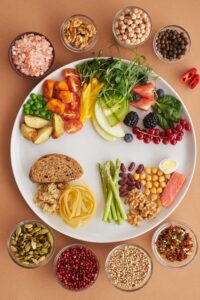Regularity
Foods to Eat when Constipated
Natural laxative foods from your local grocery store can be a first line remedy for constipation. Rhubarb, cabbage, carrots and kale all help with regularity. A bit of honey or molasses is fine for occasional constipation. Most natural laxative foods help by adding fiber to a diet. Insoluble fiber is primarily a bulk forming agent. Soluble fiber absorbs water, which allows it to act as a stool softener. Some natural laxative foods like thistle milk and flax seed oil soften stools through different mechanisms. Other natural laxative foods stimulate the bowels or act as a lubricant. Make sure to drink plenty of water with any constipation remedy. A proper diet is the best daily defense against constipation.
Below are the Healthy choices when constipated:
 Whole Fruit: Berries, peaches, apricots, plums, grapes, rhubarb, prunes, pear, apples, are some of the best high-fiber fruits. For the best fiber boost, eat the peel as well.
Whole Fruit: Berries, peaches, apricots, plums, grapes, rhubarb, prunes, pear, apples, are some of the best high-fiber fruits. For the best fiber boost, eat the peel as well.
Whole grains: Stay away from white flour and white rice and enjoy whole grains instead, which provide more fiber. Whole grains include oats, brown rice, whole wheat, quinoa, couscous, barley, and rye.
Vegetables: Carrots, zucchini, pepper, beets, leaks, green beans, cauliflower, broccoli.
Nuts: Walnuts and almonds will also add fiber to your diet.
Seeds: Several kinds of seeds are excellent sources of fiber. You can add them to your smoothies or sprinkle them on yogurt or salads. Chia, ground flaxseeds, and psyllium are some of the most touted.
Beans and Legumes (with caution): Legumes such as chickpeas, soybeans, lentils, navy beans and kidney beans are good sources of fiber. However, they have a well-earned reputation for being gassy.
Adding Bulk and Softening Stool
Fiber in natural laxative foods adds bulk to stool and softens it. The increased volume of the stool induces the smooth muscles of the large intestine to push the stool along. Softer stool is more pliable and moves forward more easily. It takes 20 to 35 grams of daily fiber to maintain regularity. Unfortunately, the average person only eats 10 to 15 grams of fiber each day. Some dietary adjustments in eating habits can add much needed fiber to meals.
Choose whole grains over refined grains. Whole grains still contain the bran of the grains, a major source of fiber. A serving of brown rice has 2.4 grams of fiber, while a serving of white rice has only 0.5 grams of fiber. Include legumes with meals. They are a good source of both fiber and protein. If gassiness is a concern, make sure to cook the beans properly and slowly increase the daily intake of beans over time. Fresh fruits and vegetables are a reliable source of fiber. Apples, leafy greens, citrus fruits and prunes are particularly good. High fiber foods keep the bowels moving.

Stimulating and Lubricating the Large Intestine
A few natural laxative foods work by stimulating peristalsis or lubricating the large intestine. Peristalsis is a wave of muscle contractions. It keeps food moving through the digestive system. Coffee, ginger and a few species of aloe will trigger peristalsis in the large intestine. Lubricants make it easier for waste to slide through the colon. Edible oils such as safflower oil and soybean oil lubricate the bowels. These oils are dense with calories, so be sure to cut calories elsewhere to maintain a balanced calorie count. A healthy diet prevents constipation. It can even relieve irregularity after the fact. High fiber natural laxative foods work by making stool larger and more malleable. Stimulating natural laxative foods cause the muscles of the large intestine to contract. This pushes waste out of the body. Lubricating natural laxative foods allow waste to glide through the colon.
References:
- Prescription for Nutritional Healing by Phyllis A. Balch and James F. Balch
- Linda Page’s Healthy Healing 12th edition by Linda Page
- Foods that Heal by Bernard Jensen
- Discovery Health http://health.howstuffworks.com/wellness/natural-medicine/home-remedies/home-remedies-for-constipation.htm
- PDR for Herbal Medicines 1st edition from the Medical Economics Company
Like? Share with your friends
Learn more information on H2Go for Daily Regularity and Occasional Constipation*

